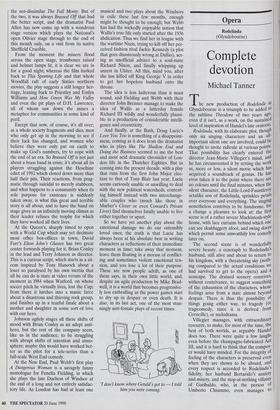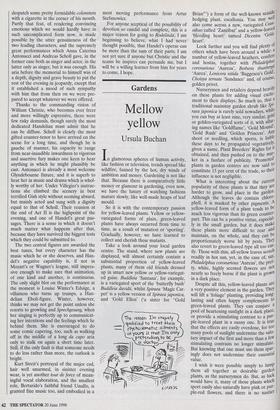Opera
Rodelinda (Glyndebourne)
Complete devotion
Michael Tanner
The new production of Rodelinda at Glyndeboume is a triumph to be added to the sublime Theodora of two years ago, even if it isn't, as a work, on the sustained level of inspiration of Handel's late oratorio• Rodelinda, with its elaborate plot, though only six singing characters and an all- important silent one are involved, could be thought to invite ridicule at various points. That possibility has clearly entered the director Jean-Marie Villegier's mind, and he has circumvented it by setting the work as, more or less, a silent movie which has acquired a soundtrack of genius. He has even taken it to the point where there are no colours until the final minutes, when the silent character, the Little-Lord-Fauntleroy actalike son of Rodelinda, sprinkles petals over everyone and everything. The staging nonetheless contrives to be handsome, for a change a pleasure to look at: the first scene is of a rather severe Mackintosh-style house, with lace curtains behind which one can see skulduggery afoot, and swing doors which permit some unworthily low comedy later on.
The second scene is of wonderfully severe beauty, a cenotaph to Rodelinda's husband, still alive and about to return to his kingdom, with a threatening sky (noth- ing compared to the actual conditions We had survived to get to the opera) and a seascape. The drained scenery contrives, without contrivance, to suggest something of the exhaustion of the characters, whose feelings arise from a state almost beyond despair. There is thus the possibility of things going either way, to tragedy (or tragicomedy, since it is derived from Corneille), or melodrama.
Villegier manages, with extraordinary resource, to make, for most of the time, the best of both worlds, as arguably Handel does too. There were quite a few laughs even before the champagne-lubricated Act III, and it is hard to think that the compos- er would have minded. For the integrity of feeling of the characters is preserved even when they are shown to be absurd, and every respect is accorded to Rodelinda's fidelity, her husband Bertarido's anxiety and misery, and the stop-at-nothing villainy of Garibaldo, who, in the person of Umberto Chiummo, even manages to despatch some pretty formidable coloratura with a cigarette in the corner of his mouth. Partly that feat, of rendering convincing emotions which we would hardly have in such uncomplicated form now, is made possible by the utter genuineness of the two leading characters, and the supremely great performances which Anna Caterina Antonacci and Andreas Scholl gave, in the former case both as singer and actor, in the latter only as singer, but it was enough. His aria before the memorial to himself was of a depth, dignity and grave beauty to put the rest of the evening in jeopardy, except that it established a mood of such sympathy with him that from then on we were pre- pared to accept whatever we were offered.
Thanks to the commanding vision of William Christie, who becomes ever freer and more willingly expressive, there were few risky demands, though surely the most dedicated Handelian must admit that he can be diffuse. Scholl is clearly the most gifted counter-tenor to have arrived on the scene for a long time, and though he is gauche of manner, his capacity to range from near-inaudible inwardness to vigorous and assertive fury makes one keen to hear anything in which he might plausibly be cast. Antonacci is already a most welcome Glyndebourne fixture, and it is superb to hear her in music and drama which is whol- ly worthy of her. Under Villegier's instruc- tions she climbed the scenery in best terrified Gish style without seeming absurd, but mainly acted and sung with a dignity equal to that of Scholl. Their reunion at the end of Act II is the highpoint of the evening, and one of Handel's great pas- sages. There is a sense in which it doesn't much matter what happens after that, because they have survived the biggest tests which they could be submitted to.
The two central figures are awarded the best tunes, but every character has the music which he or she deserves, and Han- del's negative capability is, if not in Mozart's or Wagner's league, still impres- sive enough to make sure that animation, of one kind and another, is continuous. The only slight blot on the performance at the moment is Louise Winter's Eduige, a villainess who turns up trumps, a Han- delian Eboli-figure. Winter, however, thinks we may not get the point unless she resorts to growling and Sprechgesang when her singing is perfectly up to communicat- ing her intentions and the feelings which lie behind them. She is encouraged to do some comic capering, too, such as walking off in the middle of a long da capo aria only to stalk on again a short time later. Still, if the only fault is that someone needs to do less rather than more, the outlook is bright.
Kurt Streit's portrayal of the major cad, hair well smarmed, in sinister evening wear, is yet another tour de force of mean- ingful vocal elaboration, and the smallest role, Bertarido's faithful friend Unulfo, is granted fine music too, and embodied in a most moving performance from Artur Stefanowicz.
For anyone sceptical of the possibility of devotion so candid and complete, this is a major reason for going to Rodelinda. I am beginning to believe, what I had never thought possible, that Handel's operas can be more than the sum of their parts. I am not yet sure if anyone but Christie and the teams he inspires can persuade me, but I will be a willing learner from him for years to come, I hope.



























































 Previous page
Previous page